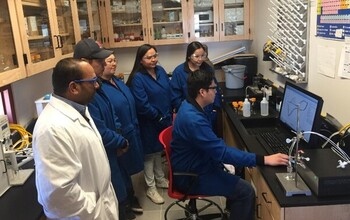NSF's Divisions of Graduate Education and Materials Research partner to help bridge gap between classrooms and labs

Students at Navajo Technical University participate in a lab demonstration.
September 21, 2023
$1.6 million in supplemental funding will help connect students and early-career researchers with NSF-funded centers and facilities, expanding access to hands-on training and broadening participation in cutting-edge lab work.
The U.S. National Science Foundation's Graduate Education Division and Materials Research Division are partnering to help provide underrepresented groups in STEM with additional access to diverse education, research, and training opportunities. These opportunities will empower minority-serving institutions to deliver materials research expertise that strengthens the future scientific workforce and builds institutional capacity for researchers at NSF-funded centers.
This partnership granted 11 supplemental awards to existing awardees of NSF's Research Traineeship program (NRT) and Partnerships for Research and Education in Materials program (PREM), with the overarching goal of strengthening the U.S. scientific workforce and broadening participation in the scientific enterprise.
“The NRT program is constantly looking for new ways to expand the reach and scope of research traineeships,” said Jacqueline E. Huntoon, director of NSF’s Division of Graduate Education. “Through this collaboration with the PREM program, we are better positioned to prepare diverse cohorts of STEM graduate students for a range of careers in high-priority research areas, such as materials research.”
Each supplemental award will support new collaborations aimed at facilitating innovative and multidisciplinary research in the field of materials science. In total, the $1.6 million in supplemental funding will provide hands-on materials research experience for more than 550 students and 20 postdoctoral researchers.
“This partnership allows NSF to greatly amplify our efforts to expand and broaden participation in materials research and education," says Germano Iannacchione, director of NSF's Materials Research Division. "There is a critical need to fully tap the nation’s talent wherever it may be. By engaging with NRT projects, PREM sites will create stronger connections within the scientific community and provide enhanced opportunities for students from underrepresented backgrounds."
The new 2023 NRT-PREM supplement awardees are:
- University of Puerto Rico at Humacao PREM in partnership with University of Pennsylvania NRT
- Florida International University PREM in partnership with University of Georgia NRT
- Navajo Technical University PREM in partnership with Stony Brook University NRT
- California State University, Northridge PREM in partnership with University of California, Merced NRT
- University of Texas El Paso PREM in partnership with Stony Brook University NRT
- University of Texas Rio Grande Valley PREM in partnership with Tuskegee University NRT
The NRT program aims to broaden participation through the development of interdisciplinary approaches to graduate research and traineeships designed to prepare graduates to tackle societally relevant challenges. The PREM program aims to broaden participation in materials research and education by developing pathways for college students and postdocs from underrepresented groups in partnership with DMR-supported centers and facilities.
For more information, visit NSF's Research Traineeship program (NRT) and Partnerships for Research and Education in Materials program (PREM).
The U.S. National Science Foundation propels the nation forward by advancing fundamental research in all fields of science and engineering. NSF supports research and people by providing facilities, instruments and funding to support their ingenuity and sustain the U.S. as a global leader in research and innovation. With a fiscal year 2023 budget of $9.5 billion, NSF funds reach all 50 states through grants to nearly 2,000 colleges, universities and institutions. Each year, NSF receives more than 40,000 competitive proposals and makes about 11,000 new awards. Those awards include support for cooperative research with industry, Arctic and Antarctic research and operations, and U.S. participation in international scientific efforts.
Connect with us online
NSF website: nsf.gov
NSF News: nsf.gov/news
For News Media: nsf.gov/news/newsroom
Statistics: nsf.gov/statistics/
Awards database: nsf.gov/awardsearch/
Follow us on social
Twitter: twitter.com/NSF
Facebook: facebook.com/US.NSF
Instagram: instagram.com/nsfgov


